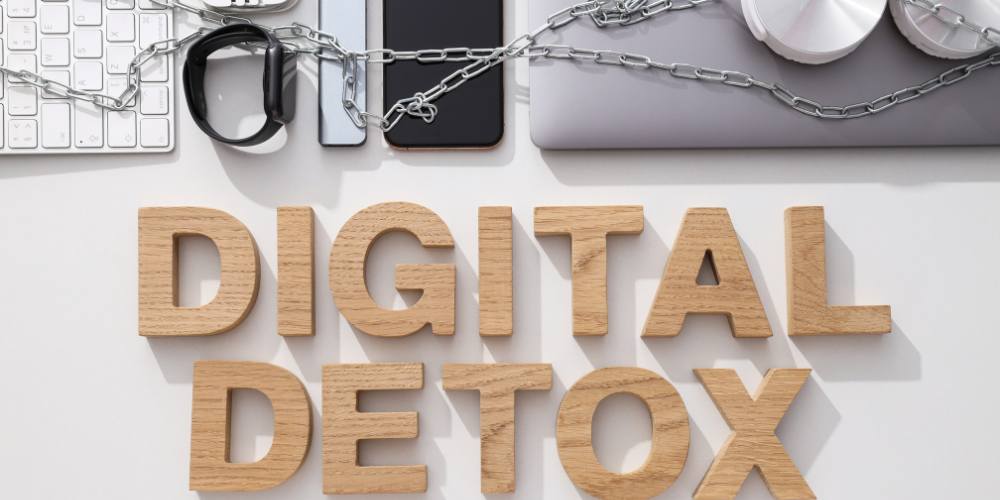In today’s hyperconnected world, it’s easy to feel astounded by the constant barrage of social media updates, notifications, and emails. While technology has brought incredible convenience and connection, it’s also led to an epidemic of digital overload. This constant connectivity can leave us feeling stressed, anxious, and disconnected from the real world. That’s where the notion of a digital detox comes in.
What is a Digital Detox, and Why is it More Important Than Ever?
A digital detox is a period of time when you intentionally detach from digital devices and technology. It can last from a few hours to days or weeks. The goal is to give yourself a break from screens’ constant invigoration and reconnect with yourself, your loved ones, and the world around you.
A digital detox is more important than ever in a world constantly bombarded with information and distractions. It allows us to:
- Reduce stress and anxiety: Constant notifications and the pressure to stay connected can lead to chronic stress and anxiety. Disconnecting can give our minds a much-needed rest.
- Improve focus and productivity: Digital distractions can fragment our attention and make it difficult to focus on tasks. Unplugging can help us regain our focus and be more productive.
- Enhance sleep: The blue light emitted from screens can disrupt our sleep patterns. A digital detox can enhance sleep quality and leave us feeling more refreshed.
- Strengthen relationships: When constantly glued to our phones, we miss out on genuine connection with the people around us. Unplugging allows us to be more present and engaged in our relationships.
Benefits of Unplugging: Improving Mental Health, Productivity, Sleep, and Relationships
The perks of a digital detox extend beyond just feeling less stressed. Studies have shown that disconnecting from technology can lead to a variety of positive outcomes:
- Mental Health: Lessened symptoms of anxiety and depression, improved mood, and increased self-awareness.
- Productivity: Enhanced focus, improved problem-solving skills, and increased creativity.
- Sleep: Improved sleep quality, increased sleep duration, and reduced daytime sleepiness.
- Relationships: Digital detox helps make deeper connections with loved ones, improve communication, and increase empathy.
Addressing Concerns: Overcoming the Challenges and Anxieties of Disconnecting
While the benefits of a digital detox are clear, it’s natural to have concerns about disconnecting. Some common anxieties include:
- Fear of missing out (FOMO): The trepidation of losing essential updates or events can be a significant barrier to unplugging.
- Work or school obligations: Many of us rely on technology for our jobs or studies, making it difficult to disconnect completely.
- Social pressure: Unplugging can feel like going against the grain in a society that values constant connectivity.
Here are some strategies to overcome these challenges:
- Start small: Begin with a short detox period, such as a few hours or a weekend. Gradually increase the duration as you become more comfortable.
- Set boundaries: Let friends, family, and colleagues know you’ll be unavailable for a certain period. Set up an auto-reply for your email and turn off notifications on your phone.
- Plan alternative activities: Fill your time with various activities that don’t entail screens, such as reading, spending time in nature, exercising, or connecting with loved ones.
- Challenge your FOMO: Remember that most things can wait, and the world won’t fall apart if you’re offline for a while.
- Use technology to your advantage: Use the tools and apps that help you limit your screen time and manage your digital habits.
Long-Term Sustainability: Integrating Healthy Digital Habits
A digital detox isn’t a one-time fix. In the long run, developing healthy digital habits is essential to maintain the continuous benefit of digital detox. Here are some tips:
- Set screen time limits: Use the built-in tools or download apps to track and limit your screen time.
- Create tech-free zones: Designate precise areas of your home or certain times of day as tech-free zones.
- Practice mindfulness: Be more aware of your digital habits and how they affect you. Take breaks from screens throughout the day to check in with yourself.
- Curate your online environment: Unfollow accounts or unsubscribe from newsletters that don’t add value to your life.
- Prioritize real-world connections: Make time for face-to-face interactions with friends and family.
Conclusion
A digital detox is a potent tool for reclaiming time, attention, and well-being. While it may seem daunting initially, the benefits are well worth it. By disconnecting from technology, you can enhance sleep, reduce stress, improve focus, and strengthen relationships.
Remember, a digital detox is not about abandoning technology altogether. It’s about creating a healthier relationship with it. By setting boundaries and developing healthy digital habits, you can enjoy the incentives of technology without letting it take over your life.
Disclaimer
This blog post contains information intended to provide general information only and does not constitute medical or professional advice. Suppose you are experiencing severe and persistent stress, anxiety, sleep disturbances, or other mental health concerns. In that case, conferring with a qualified health professional for personalized guidance and support is important.


